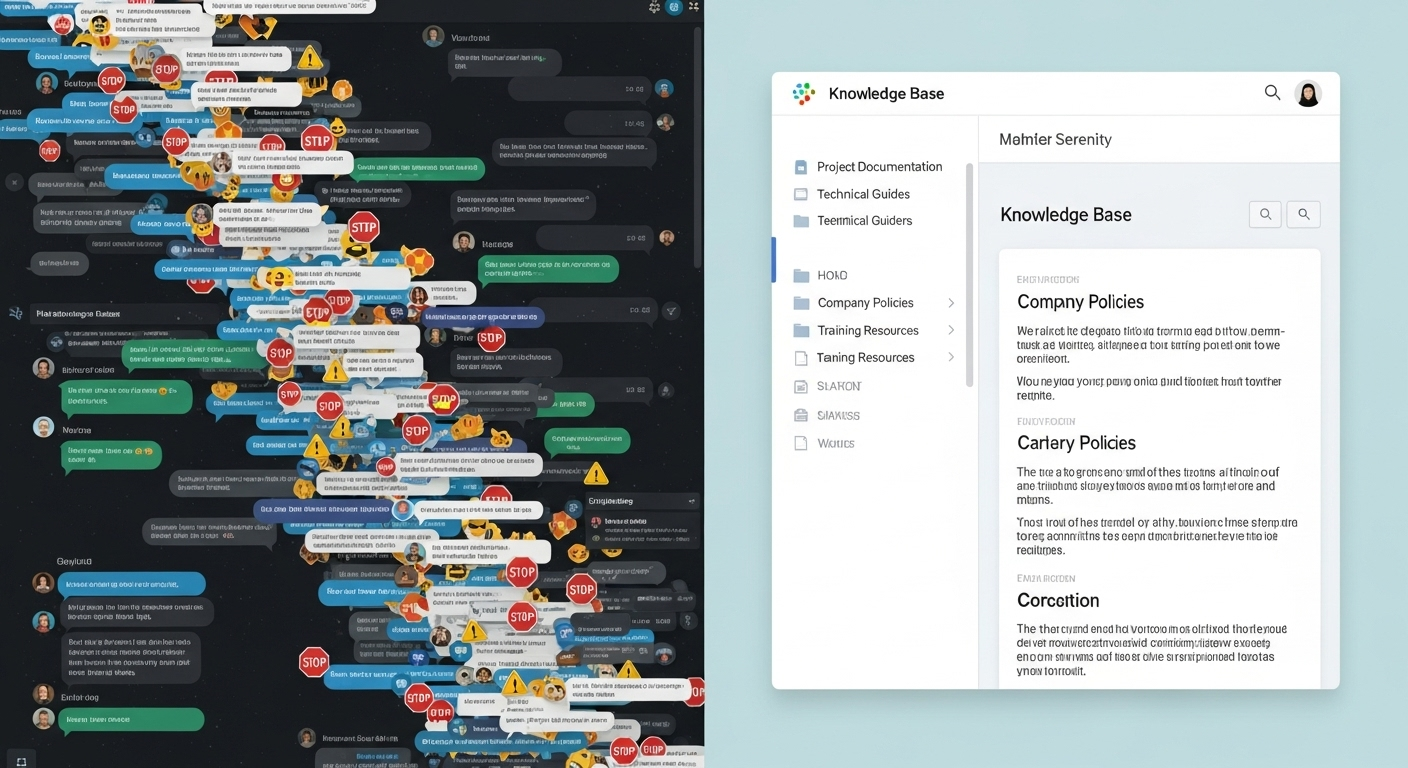Can Slack Be Used as a Knowledge Base? (Pros, Cons, and Solutions)

Your team lives in Slack. Every decision gets discussed there. Every problem gets solved there. Every piece of important knowledge gets shared there.
So naturally, you start thinking: "Why don't we just use Slack as our knowledge base? Everything's already there anyway."
It's a logical thought. It's also a trap.
While Slack has accidentally become the default repository for most teams' knowledge, trying to actually use it as a knowledge base is like trying to use a river as a filing cabinet. Sure, everything flows through it, but good luck finding anything when you actually need it.
The Slack-as-Knowledge-Base Honeymoon Phase
In the beginning, it feels brilliant. Your team is already talking in Slack, sharing files, making decisions. It's organic. It's natural. It's... working?
For about three months.
Then reality hits. Someone asks, "What did we decide about the pricing structure for enterprise clients?" You know that conversation happened. You remember participating in it. But where the hell is it?
Was it in #general? Maybe #sales? Could have been a DM thread that spiraled into a group conversation. Or perhaps it was buried in that massive thread about the product launch that somehow became about everything except the product launch.
Twenty-three minutes of scrolling later, you give up and ask the question again, restarting a conversation that already happened and potentially making different decisions because you can't access the context from the original discussion.

The Brutal Reality: Why Slack Fails as a Knowledge Base
Slack was designed for communication, not knowledge management. Using it as a knowledge base is like using a phone booth as a library—technically possible, but fundamentally wrong for the job.
Problem #1: The Information Black Hole
Slack's search is notoriously awful for knowledge retrieval. It finds everything and nothing at the same time. Search for "client onboarding" and you'll get 247 results including:
• Someone saying "I need to finish client onboarding docs" (not helpful)
• A meme about onboarding with the word in the caption (definitely not helpful)
• The actual strategic discussion you need (buried at result #156)
The signal-to-noise ratio is so bad that most people give up searching and just ask someone directly, defeating the entire purpose of having the knowledge accessible.
Problem #2: Context Collapse
Slack conversations are linear and ephemeral. Important decisions get made across multiple disconnected threads, scattered across different channels, happening over days or weeks. The context that makes a decision understandable gets lost in the flow of daily chatter.
Six months later, you find the message that says "Let's go with Option B for the API integration." But what was Option A? What were the trade-offs? Who made the recommendation and why? That context is scattered across seventeen different threads and three different channels.
Problem #3: The Knowledge Graveyard
In Slack, knowledge doesn't organize itself—it just piles up. There's no taxonomy, no tagging, no hierarchy. Everything exists at the same level of importance, which means nothing is actually important.
Your CEO's strategic vision for next year gets the same treatment as someone's lunch poll. Your carefully thought-out client feedback analysis sits right next to a GIF reaction. Critical business decisions get buried under birthday celebrations and random observations.
The result? Your team's collective intelligence becomes archaeologically complex to access.

Problem #4: The Participation Paradox
Here's the cruel irony: the more your team uses Slack for knowledge sharing, the less useful that knowledge becomes. More conversations mean more noise. More channels mean more fragmentation. More activity means important discussions get buried faster.
Success in communication creates failure in knowledge management.
The "Solutions" That Don't Actually Solve Anything
Most teams try to force Slack into being a knowledge base through organizational gymnastics:
"We'll create specific channels for documentation!"
Reality: Those channels become graveyards that no one reads because the real discussions still happen in the active channels.
"We'll use pinned messages for important decisions!"
Reality: Channels can only pin 100 messages, and everything feels important when you're pinning it.
"We'll train everyone to use better search terms!"
Reality: You can't train people to remember how they phrased something three months ago.
"We'll use threads more consistently!"
Reality: Threads help with organization but make search even worse because important information gets hidden inside collapsed conversations.
These aren't solutions—they're Band-Aids on a fundamental architecture problem.
What Actually Works: Adding Intelligence to Your Slack Knowledge
The real solution isn't trying to force Slack to be something it's not. It's recognizing that Slack is brilliant at what it does—facilitating communication—and adding a proper knowledge layer on top of it.
That's exactly what Slack Brain does.
Instead of replacing Slack or changing how your team communicates, Slack Brain creates an intelligent knowledge management system that understands your Slack conversations and transforms them into organized, searchable, permanent knowledge.
Intelligent Knowledge Discovery
Slack Brain doesn't try to save every emoji reaction and casual comment. Instead, it uses AI to identify the conversations that actually matter—the decision-making threads, the problem-solving discussions, the strategic planning sessions—and automatically captures them before they get lost in the noise.
It's like having a brilliant assistant who sits in all your meetings, takes notes on the important stuff, and files it away in a system you can actually use.
Structured Content Organization
Unlike Slack's flat message timeline, Slack Brain creates an organized taxonomy of your knowledge. Decisions get tagged as decisions. Problems and solutions get connected. Related discussions get linked across channels and time periods.
Your chaotic Slack conversations become an organized knowledge repository with structure, hierarchy, and logic.

Semantic Search That Actually Works
Forget trying to remember exact keywords. With Slack Brain, you can ask questions the way humans actually think: "What was our decision about remote work policies?" or "How did we solve the API timeout issue last quarter?"
The AI understands context, intent, and meaning—not just keyword matching.
Hybrid Knowledge Architecture
Slack Brain combines the best of both worlds: it captures the conversational context that makes decisions understandable while organizing information in a way that makes it retrievable. You get the natural knowledge sharing of Slack with the structure and accessibility of a proper knowledge base.
The Transformation: From Communication Tool to Knowledge Engine
Here's what happens when you add proper knowledge management to your Slack workflow:
Decisions have context. When someone asks about a past decision, they don't just get the conclusion—they get the reasoning, the alternatives considered, and the factors that influenced the choice.
Problems stay solved. When similar issues arise, your team can access previous solutions instead of reinventing the wheel every time.
New team members get smart fast. Instead of asking dozens of questions that have already been answered, they can access the accumulated wisdom of your team's past discussions.
Knowledge compounds instead of disappearing. Each conversation builds on previous ones instead of starting from scratch.
"We stopped fighting with Slack search and started actually building on our past conversations. It's like our team finally has a memory that works." - David L., Engineering Manager
The Bottom Line: Slack + Intelligence = Actual Knowledge Management
Can Slack be used as a knowledge base? Not effectively on its own.
Should you stop using Slack for team communication? Absolutely not.
The answer is adding the missing intelligence layer that transforms your team's natural communication patterns into organized, accessible knowledge.
Your team is already creating valuable knowledge every day in Slack. The question is whether that knowledge will be accessible when you need it, or whether it'll just add to the noise.
Slack Brain ensures your team's collective intelligence becomes a permanent competitive advantage instead of disappearing into the communication stream.
Ready to transform your Slack from a communication black hole into an intelligent knowledge engine? Try Slack Brain today and turn your team's conversations into lasting competitive advantage.
Because great teams don't just communicate—they remember.
P.S. Your team is already doing the hard work of creating knowledge through their discussions. Slack Brain just makes sure that work doesn't disappear into the digital ether. Start building your intelligent knowledge base today with our 30-day risk-free trial.